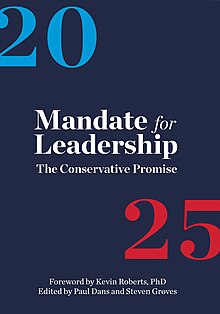
- Focus on Family Values: Project 2025 emphasizes restoring traditional family values and views the family as the core of American society, arguing that these values have been undermined under Democratic regimes.
- Border Security: The project advocates for stricter border security, contrasting with the Democratic open border policies, which it claims have led to significant illegal immigration.
- Overhaul of Federal Institutions: Project 2025 proposes centralizing federal institutions under the President’s control to counter what conservatives see as liberal politicization and overreach within these entities.
- Shift in Climate Policy: The project downplays the emphasis on climate change and renewable energy, advocating for increased use of fossil fuels and viewing climate change concerns as exaggerated by liberal agendas.
Project 2025 is a blueprint developed by the Heritage Foundation and other conservative think tanks in the US. It addresses multiple topics such as restricting abortion rights, rolling back LGBTQ rights, focusing on family values, and reducing efforts to address issues like climate change and income inequality. It’s important to note that nearly a hundred conservative institutions have been involved in creating Project 2025.
Although there haven’t been any public statements about Project 2025 from Donald Trump, it is said to be the brainchild of former allies of his. If Republicans come to power in November, these conservative institutions could have a direct or indirect impact on the United States. Democrats have called Project 2025 a disaster for the United States. They consider themselves to be liberal in values and oppose restrictions proposed by Project 2025. Democrats believe that climate change is an existential threat to humanity, while Project 2025 views efforts to combat it as an attempt to roll back the progress made by Democrats.
Pillars of Project 2025
The major pillar of Project 2025 centres around family values. The Heritage Foundation asserts that family values in the United States have been burdened, particularly under Democratic regimes. They argue that the family is the core of America and that this should be a major concern, with particular respect given to families. Additionally, Project 2025 addresses securing the borders, contrasting with the Democratic stance, which has been more liberal regarding immigration. The Democrats’ open border policy has reportedly led to 7.8 million people entering the United States illegally. The Republican Party and conservative institutions in America, respected around the world, believe that the U.S. is less respected due to these policies.

A very important decision in Project 2025 is the overhaul of federal institutions in the United States. Under Project 2025, these institutions would become more centralized, coming under the direct control of the President. The Heritage Foundation argues that federal institutions, which were meant to be neutral, have become politicized, consisting of individuals with Marxist and Leninist leanings, according to conservative factions. These institutions are seen as being unnecessarily involved in matters outside their purview.
Conservative figures, including Donald Trump, blame federal institutions for overstepping their bounds. They believe that liberals have hijacked the U.S. bureaucracy, leading to a persistent interventionist approach in American policy. This, they argue, has taken the country down a path that is neither healthy nor beneficial. Project 2025 aims to address these issues by restructuring the bureaucracy to ensure it aligns more closely with conservative values and priorities.

An important aspect of Project 2025 is its stance on climate policy. Under Donald Trump, the view was that climate change, often labelled as an existential threat to humanity by Democrats and liberal institutions, is more of a political pretext used to push green and renewable energy agendas. Conservatives argue that climate change is a natural phenomenon, exacerbated by human activities but not to the catastrophic extent claimed by liberals.
Project 2025 asserts that there will be less focus on climate initiatives and renewable energy projects. Instead, the emphasis will be on non-renewable resources, such as fossil fuels, including drilling within the United States. This shift reflects the belief that the current liberal climate policies are misguided and that a more balanced approach, utilizing traditional energy sources, is needed for America’s future.
Individual Rights and Family Values
A crucial aspect of Project 2025 pertains to individual rights, particularly concerning abortion, LGBTQ rights, and family values. Conservatives believe that these areas have been significantly eroded in the United States, posing a danger to personal liberties.
Project 2025 emphasizes the importance of clear gender definitions, asserting that there are only two genders: male and female. The conservative view is that non-binary identities and gender fluidity are psychological issues that need to be addressed accordingly. They argue that the focus on LGBTQ rights has negatively impacted the societal image of the United States and has disrupted the natural course of human civilization.

Regarding abortion, Project 2025 aims to impose limitations. During his tenure, Donald Trump was outspoken against abortion, which was controversial and affected his support among American women. The new strategy under Project 2025 seeks a balance between women’s rights and abortion regulations, suggesting that while abortion should be limited, there should be respect for women’s rights as well.
Conservatives argue that the emphasis on eligibility criteria and liberal policies has overshadowed essential family values. They believe that the expansion of liberal ideologies has used abortion as a pretext for population control, which they view as detrimental to both the country and society. Project 2025 underscores the need to uphold family values and maintain a balance that respects individual rights while fostering a strong societal structure.
Will Project 2025 be Implemented?
It’s still very early and premature to say whether Project 2025 will become a reality. Even the Republican Party has not fully endorsed it; it remains an independent idea proposed by some conservative figures in the United States. However, the ideas presented by Project 2025 align closely with those of other conservative entities, such as the Heritage Foundation, and the Republican Party.
Donald Trump has not explicitly endorsed Project 2025, but that doesn’t mean he is opposed to the changes it advocates. The goal of Republicans and other conservative institutions is to create an America that aligns with their ideals. Every political party, when in power, seeks to shape society according to its ideology. Republicans believe that if the democratic system follows their conservative ideas, it will be easier to implement their policies. Similarly, the Republican Party aims to embed its ideological views into every aspect of society, creating a favourable base for its policies to be introduced and sustained.
Is Project 2025 Legit?
A major question that arises is whether Project 2025 aligns with the current political climate and concepts within the United States. Given the political spectrum, conservative and liberal viewpoints often clash, with conservatives opposing Democratic ideas and vice versa. However, from a general perspective, the principles presented in Project 2025—such as family values, border security, and respect for traditional norms—are not inherently controversial.
The ideas of strengthening traditional family values and respecting individual rights are broadly accepted. Project 2025’s proposals, including focusing on these values and enhancing border security, may seem less controversial and more legitimate, especially in light of the current demographics and political landscape of the United States. These changes could potentially help the country align more closely with conservative ideals and, in turn, address some contemporary issues effectively.
Aayush Pal is a freelance writer on contemporary geopolitical developments. The views expressed in his work are entirely his own.
